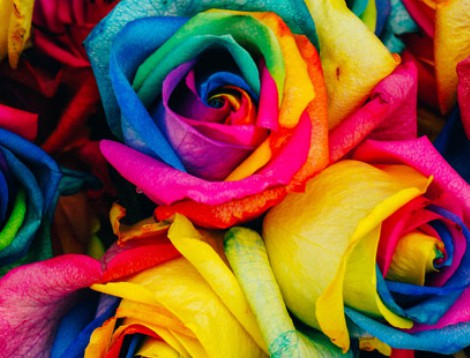There is much more to color than meets the eye. Strangely enough, us humans have a close emotional bond with the visible light aspect of the electromagnetic spectrum, a bond so strong it can easily make us feel stressed out with a raised heart rate or leave us with a warm and fuzzy sense of satisfaction.
色彩,远不止我们眼睛看上去的那么简单。但奇怪的是,我们人类与这些电磁波谱上的可见光,竟有着说不请道不明的情感联系,这种联系如此强烈,以至于它很容易能让我们心率加快甚至感到压力,又或者让我们有一种温暖而模糊的满足感。
If you’re looking to cool your jets and relax, one of the most calming colors to be surrounded by, according to a global survey from paper merchant G F Smith and psychologists at the University of Sussex, UK is navy blue, closely followed by teal-like turquoise, and soft pastel pink.
据造纸商G·F·史密斯以及英国萨塞克斯大学心理学家的一项全球调查,如果你想冷静放松下来,海军蓝是最好的选择,其次是蓝绿色和柔粉色。
The World's Favourite Colour Project involved 26,596 participants from over 100 different countries, possibly the largest ever color study, to get some insights into the world's most beloved color. To do this, they asked the human guinea pigs to list attributes and emotions that they associate with certain colors in the hopes of also finding out what different hues mean to different people, and what may influence this.
这次“世界上最受欢迎的颜色”实验,研究对象涉及100多个国家的26596名参与者,目的是了解最受人们喜爱的颜色。这可能是有史以来规模最大的颜色研究了。为了达到实验目的,他们让实验对象列出特定颜色相关的属性和代表情绪,既希望找出不同的颜色对不同的人意味着什么,也希望弄明白这其中有哪些影响因素。
"Many studies have investigated the link between color and emotion. Although not all of these studies agree, some consistent results can be extracted from the literature,” Professor Anna Franklin, a leading expert in color psychology at the University of Sussex, wrote in a blog post about the project.
萨塞克斯大学色彩心理学领域的权威专家安娜·富兰克林教授在一篇关于此项目的博客文章中写道:“许多研究都调查了颜色和情绪之间的联系。虽然它们并非都得出了相同的结论,但从论文中也能找到一些共同点。”
"First, the more saturated the color is, the more it is associated with excitement and stimulation,” Franklin explained. “Second, the lighter the color, the more it is associated with calmness and relaxation. Many studies have found that blue and green are also associated with calmness and relaxation (fewer studies find no association).”
富兰克林解释说:"首先,颜色越饱满,它就越能引起兴奋和刺激;其次,颜色越浅,就越能让你感到平静和放松;再者,许多研究发现,蓝色和绿色就是‘放松色’的两个典型代表。这一点,很少会有研究否认。”
The findings also showed that orange is most often associated with happiness, while pink is viewed as the sexiest, and the colors people around the world most associated with luxury are white, purple, and orange.
研究结果还表明,橙色通常与幸福感有关,而粉红色则是性感的代名词。全世界的奢侈品都离不开白色、紫色和橙色。

In case you were curious, most people’s favorite color appears to be green or blue, although there was a lot of variety in the results. According to the ecological valence theory (just one of a handful of color preference theories), humans appear to be fond of these colors because they’re associated with environmental features we can benefit from and enjoy, such as clear skies, clean water, and vegetation. That also explains why we tend not to like murky brown colors, as we link them to dirty water, poop, and disease.
不妨告诉你,即使人各有别,人各有好,但大多数人最喜欢的颜色还是绿色或蓝色。根据生态效价理论(为数不多的‘颜色偏好理论’之一),人类之所以喜欢这些颜色,是因为它们与某些环境特征有关,而我们既能享受这些环境特征,更能从其中收益。晴朗的天空、干净的水流、翠绿的植被,不都是为我们所喜爱的吗?这也解释了为什么我们不喜欢暗褐色,因为它们总让我们想起脏水、便便和疾病。
However, while certain colors seem to embody a universal characteristic – for example, red equates to anger – it’s worth remembering some interpretations of color can vary hugely between groups.
然而,尽管某些颜色的确已被赋予了普遍的意义(就好比我们提到红色就会联想到愤怒),但我们要记住,不同群体对颜色的释义,可能存在巨大差异。
"Several studies suggest that color associations, particularly abstract concepts, can vary across cultures,” Professor Anna Franklin says. "For example, whereas white is associated with peace in some cultures, in others it is associated with death.”
安娜·富兰克林教授说:“因为还有一些研究表明,在不同的文化中,颜色代表着不同的意义,尤其涉及到抽象概念的时候,例如,白色在某种文化中意味着和平,而在另一种文化中,它却同死亡相关。”













